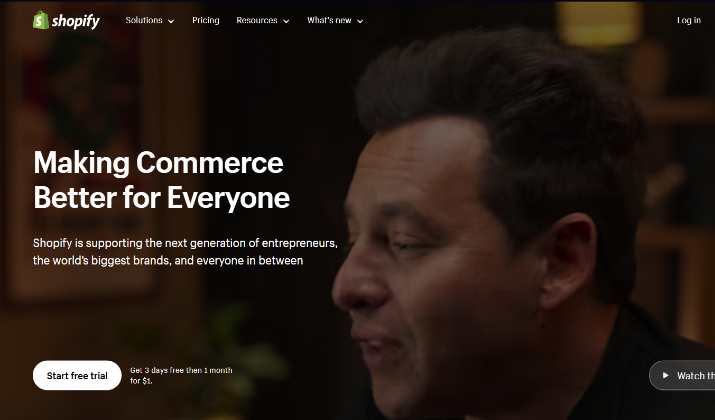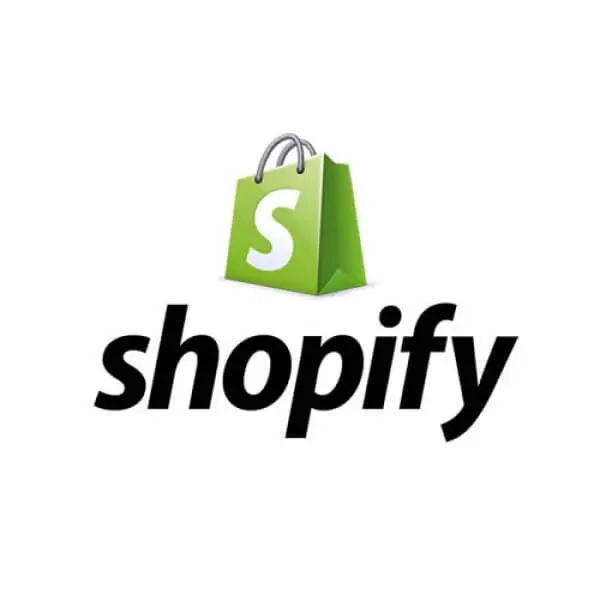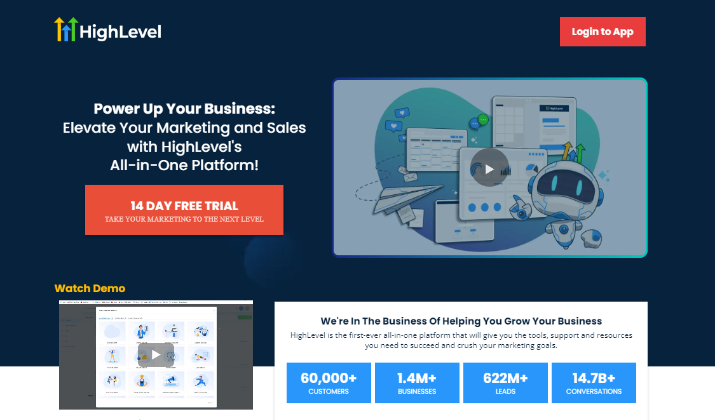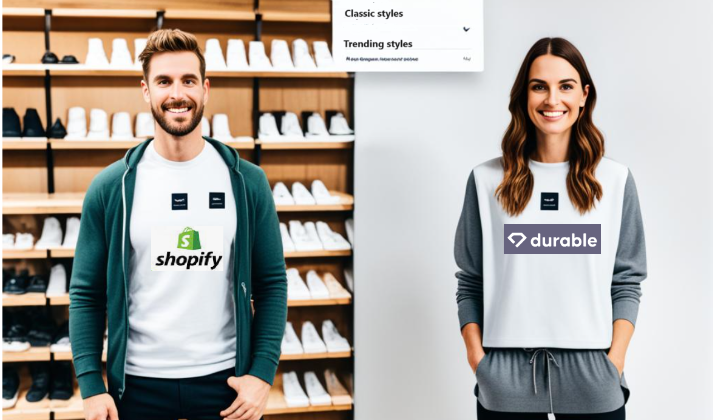Shopify and GoHighLevel are two popular platforms that businesses can use for ecommerce and marketing automation.
Shopify is an ecommerce company that offers a proprietary platform for online stores and retail point-of-sale systems, hosting millions of stores worldwide and generating significant revenue.
On the other side, GoHighLevel is an all-in-one marketing platform that offers powerful tools for ecommerce businesses to create sales funnels, automate marketing workflows, manage customer relationships, and grow their online stores.
Both the platforms have their strengths and used for similar yet distinct purposes. If you’re thinking which of these platforms you need, read the article to the end.
Today, we will review the features and functionalities of both platforms to help you determine which one is best suited for your business.
Let’s get started.
Introduction to Shopify and Its Features
Shopify is a popular and flexible ecommerce platform that makes it easy for businesses of all sizes to set up and manage an online store. Here are some of Shopify’s main features:
Easy Setup & Management
- Shopify provides a user-friendly interface and drag-and-drop website builder that allows anyone to create an online store, even without technical knowledge.
- It offers over 70 customizable themes and the ability to choose from over 100 payment gateways.
- Shopify handles hosting, security, and maintenance of the store, so merchants don’t have to worry about the technical aspects.
Powerful Backend Tools
- Shopify provides a complete backend system for managing orders, customers, products, shipping, and payments.
- It has built-in tools for calculating shipping rates and taxes automatically.
- Merchants can access the store’s backend from anywhere using Shopify’s mobile app.
SEO & Marketing Features
- Shopify’s SEO features allow merchants to optimize their store for search engines by adding title tags, meta descriptions, and more.
- It integrates with Google Analytics to track store performance and customer behavior.
- Merchants can sell directly on social media channels and other online marketplaces using Shopify’s features.
Analytics & Reporting
- Shopify Analytics provides detailed insights into sales, traffic sources, and customer activity.
- It includes features like abandoned cart recovery to re-engage potential customers.
Scalability & Flexibility
- Shopify offers plans for businesses at every stage, from startups to large enterprises.
- Merchants can add functionality to their store by installing apps from Shopify’s extensive App Store.
- Shopify’s APIs allow developers to build custom integrations and experiences.
Shopify’s combination of ease-of-use, powerful features, and flexibility make it a top choice for businesses looking to establish an online presence and grow their ecommerce operations.
Also read: Shopify vs Odoo
Try Shopify free followed by first month at just $1. No credit card required. Limited Time Offer.
What is GoHighLevel? What are Its Key Features?
GoHighLevel is a comprehensive marketing platform designed for digital agencies, offering a wide range of features to streamline customer relationship management, marketing automation, and more.
Here are some of its key features:
- Funnel and Landing Page Builder: Create customized landing pages and funnels effortlessly.
- Marketing Automation: Automate marketing processes for efficiency.
- High-Level Reputation Management: Manage and monitor your online reputation effectively.
- CRM and Pipeline Management: Organize leads and track conversation history.
- Booking and Online Appointment Tool: Schedule appointments and share calendars with clients.
- GoHighLevel SMS Marketing: Send marketing messages directly to customers’ mobile phones.
- Membership Sites: Build membership sites to sell premium products or courses.
- Mobile App: Access features on the go, manage leads, appointments, and tasks conveniently.
Additionally, GoHighLevel offers white-label options, automated messaging campaigns, website and Facebook Messenger integration, detailed client dashboards, appointment booking, real-time notifications, and more.
The platform also supports unlimited sales funnel creation, customizable templates, landing page builders, and various integrations with third-party tools.
These features cater to agencies, small businesses, and individuals looking to enhance their marketing and customer management strategies effectively.
Check out: Webflow Ecommerce vs Shopify
Ecommerce Capabilities
When comparing Shopify and GoHighLevel in terms of ecommerce capabilities, there are key differences to consider in several areas such as:
1. Product Management & Inventory
- Known for its user-friendly interface, Shopify simplifies the process of setting up an online store. It offers smooth upgrade paths with different plans, strong hosting infrastructure, and less technical hassle. Shopify enables easy addition, editing, and tracking of products within the platform.
- GoHighLevel is a versatile platform that offers powerful automation and workflow capabilities for ecommerce businesses. While it excels in marketing automation and customer relationship management, it may not offer the same level of focus on product management and inventory control as Shopify.
2. Checkout &Payment Processing
- Shopify is renowned for its seamless checkout process, various payment gateways and smooth transaction experience for customers. Shopify’s hosted solution simplifies the checkout process for both customers and merchants.
- GoHighLevel is a robust marketing platform with features like funnel and landing page builders, but its emphasis isn’t as strong on checkout and payment processing functionalities compared to Shopify.
3. Shipping & Fulfillment
- Shopify provides comprehensive shipping and fulfillment features, allowing merchants to set up shipping rates, print shipping labels, and manage orders efficiently. It offers integrations with major shipping carriers and provides tools to streamline the shipping process for online retailers.
- GoHighLevel offers automation and CRM tools that can enhance the overall customer experience. However, It’s isn’t really specialized in shipping and fulfillment functionalities as Shopify.
Explore Sellfy vs Redbubble
Try Shopify free followed by first month at just $1. No credit card required. Limited Time Offer.
Marketing & Sales Funnels
When comparing Shopify and GoHighLevel in terms of marketing and sales funnels, there are some key differences to consider:
1. Email Marketing & Automation
- GoHighLevel excels in providing powerful email marketing and automation capabilities. It allows you to create and manage email campaigns, track user activity, and segment your customer base for targeted promotions.
- While Shopify offers email marketing features, it may not provide the same level of advanced automation and segmentation as GoHighLevel.
2. Landing Pages
- GoHighLevel offers a robust funnel and landing page builder, enabling you to create custom sales funnels tailored to your target audience and products. This can help drive traffic and boost conversion rates.
- Shopify provides landing page creation capabilities, but the level of customization and optimization isn’t close to GoHighLevel’s funnel builder.
3. Sales Pipeline Management
- GoHighLevel comes with a powerful CRM that simplifies customer relationship management for ecommerce businesses. It allows you to easily manage and track customer interactions, handle support tickets, and address customer issues.
- Shopify offers sales pipeline management features. The depth of CRM functionality may not match GoHighLevel’s dedicated CRM tools though.
Read this too: ThriveCart vs SamCart
Reporting & Analytics
Shopify and GoHighLevel vary in terms of reporting and analytics. Here are some key differences:
1. Sales & Revenue Tracking
- Shopify offers robust sales and revenue tracking features, providing merchants with detailed reports on sales, orders, and revenue. Shopify’s analytics dashboard gives a clear overview of key metrics like total sales, average order value, and sales by product.
- GoHighLevel provides analytics and reporting capabilities. Its focus is more on marketing and lead generation metrics rather than comprehensive sales and revenue tracking.
2. Traffic & Conversion Metrics
- Shopify tracks website traffic and conversion metrics, allowing merchants to monitor visitor behavior, track referral sources, and analyze conversion rates. Shopify’s reports provide insights into top-performing products, pages, and marketing campaigns.
- GoHighLevel offers analytics and reporting features. It emphasizes more on marketing automation and lead generation.
3. Customer Data & Segmentation
- Shopify collects and stores customer data, enabling merchants to view customer profiles, order history, and contact information. Shopify also allows for basic customer segmentation based on factors like location, order value, and purchase frequency.
- GoHighLevel provides customer relationship management (CRM) features, allowing for more advanced customer data management and segmentation. GoHighLevel’s CRM enables merchants to create custom fields, tags, and pipelines to organize and analyze customer data.
While both Shopify and GoHighLevel offer reporting and analytics capabilities, Shopify excels in providing comprehensive sales and revenue tracking, detailed traffic and conversion metrics, and basic customer data management.
GoHighLevel, on the contrary, focuses more on marketing automation and lead generation, with a stronger emphasis on customer relationship management and segmentation.
Also read: Shopify vs WooCommerce
Try Shopify free followed by first month at just $1. No credit card required. Limited Time Offer.
Integrations & Customization
There are some notable differences when comparing Shopify and GoHighLevel in terms of integrations and customization:
1. Third-Party App Integrations
- Shopify offers a vast ecosystem of third-party apps and integrations, allowing merchants to extend the functionality of their online stores. Shopify’s App Store features thousands of apps covering various aspects like marketing, sales, shipping, and customer service.
- GoHighLevel offers integrations with popular platforms like Shopify. It intends to provide an all-in-one solution for agencies and marketers. The integration capabilities may not be as extensive as Shopify’s though.
2. Custom Code & Development
- Shopify provides a balance of ease of use and flexibility, allowing merchants to customize their stores using Liquid, Shopify’s templating language. Shopify also offers APIs for developers to build custom integrations and applications.
- GoHighLevel offers customization options through its dashboard, such as creating custom fields, tags, and pipelines.
3. Themes & Design Flexibility
- Shopify offers a wide range of professionally designed themes, both free and paid, that can be easily customized using the theme editor. Shopify’s themes are mobile-responsive and SEO-optimized.
- GoHighLevel provides design flexibility through its landing page and funnel builder. It targets lead capturing and conversion optimization. However, the design customization options are nowhere close to Shopify’s theme ecosystem.
Shopify is better in providing a robust ecosystem of third-party app integrations, allowing merchants to extend the functionality of their online stores.
Check out: SamCart vs Clickfunnels
User Experience
The capabilities of Shopify and GoHighLevel differ when it comes to user experience. Here are some striking differences:
1. Ease of Use for Non-Technical Users
- Known for its user-friendly interface, Shopify simplifies the process of setting up an online store, making it ideal for quick and easy store setup. It offers a structured approach to product management and inventory control, allowing for easy addition, editing, and tracking of products within the platform.
- GoHighLevel’s user interface has a steeper learning curve compared to Shopify, especially for non-technical users. However, GoHighLevel provides a versatile platform with powerful automation and workflow capabilities for ecommerce businesses.
2. Learning Curve & Training Resources
- Shopify offers a wide range of resources to help users get started and learn the platform, including tutorials, guides, and a large community of users. The platform’s intuitive design and structured approach make it relatively easy to learn and use.
- GoHighLevel may require more time and effort to learn due to its extensive features and customization options. However, the platform provides training resources and support to help users navigate its features and set up their accounts effectively.
3. Mobile Optimization & Responsiveness
- Shopify’s themes are designed to be mobile-responsive, ensuring that online stores look great and function smoothly on various devices. The platform optimizes the checkout process for mobile users, providing a seamless experience.
- While GoHighLevel offers mobile-friendly landing pages and funnels, its focus is more on conversion optimization rather than comprehensive mobile optimization. However, the platform ensures that its features are accessible and usable on mobile devices.
Shopify wins in this aspect by providing an easy-to-use interface and a structured approach to ecommerce, making it suitable for non-technical users.
GoHighLevel, on the other hand, has a steeper learning curve due to its extensive features and customization options.
Explore: Shopify vs Square POS
Try Shopify free followed by first month at just $1. No credit card required. Limited Time Offer.
Customer Support
Shopify and GoHighLevel are similar in terms of customer support. Here is a closer look:
1. Availability of Support Channels
- Shopify offers a wide range of support channels, including phone support, live chat support, email support, and a comprehensive knowledge base. Shopify’s support is available 24/7, ensuring that merchants can get help whenever they need it.
- GoHighLevel provides support through multiple channels, including phone support and live chat support exclusively for its priority customers. GoHighLevel’s support is known for being friendly, responsive, and helpful, with high overall customer ratings.
2. Response Times & Resolution Rates
- Shopify’s support is known for its fast response times and high resolution rates. Merchants can expect quick and effective solutions to their issues, ensuring minimal downtime and maximum productivity.
- GoHighLevel’s support is also known for its fast response times and high resolution rates. The platform’s support team is responsive and helpful, ensuring that issues are resolved quickly and efficiently.
3. Knowledge Base & Documentation
- Shopify offers an extensive knowledge base and documentation, providing merchants with a wealth of information on how to use the platform. The knowledge base is regularly updated, ensuring that merchants have access to the latest information and best practices.
- GoHighLevel also provides a knowledge base and documentation, although the extent of these resources may not be as comprehensive as Shopify’s. However, GoHighLevel’s support team is available to help with any questions or issues that may not be covered in the knowledge base.
Both Shopify and GoHighLevel offer multiple support channels, fast response times, and high resolution rates. So, It’s a tie when it comes to customer support.
Read this too: Shopify vs Gambio
Integrating Shopify with GoHighLevel
Integrating Shopify with GoHighLevel is a seamless process that allows you to leverage the power of both platforms for your ecommerce and marketing automation needs.
By integrating these two robust tools, you can optimize your online store’s performance and automate various aspects of your business.
Let’s explore how you can integrate Shopify with GoHighLevel in just two simple steps.
Step 1: Create a Custom App in Your Shopify Store
To initiate the integration, you need to create a custom app in your Shopify store. You can follow Shopify’s documentation to understand the steps involved and create your app effortlessly.
This app acts as a bridge between Shopify and GoHighLevel, enabling smooth data transfer and synchronization. By creating a custom app, you gain control over the integration process and can customize it to suit your specific requirements.
Step 2: Connect Shopify to Your GoHighLevel Account
In the second step, you will connect your Shopify store to your GoHighLevel account. This connection establishes the link through which data flows between the two platforms.
To establish the connection, navigate to your GoHighLevel account settings and locate the integration section.
Follow the instructions provided to connect with your Shopify store. Once the connection is successfully established, you can now enjoy the seamless transfer of data and leverage the powerful features of GoHighLevel alongside your Shopify store.
This integration enables efficient management of your ecommerce operations, enhances marketing automation, and provides a holistic view of your business.
Also read: Sellfy vs Payhip
Try Shopify free followed by first month at just $1. No credit card required. Limited Time Offer.
Conclusion
Both Shopify and Go High Level offer powerful features for ecommerce and marketing automation.
Shopify is a popular platform for setting up online stores, providing a user-friendly interface and a wide range of themes and plugins.
Go High Level specializes in comprehensive marketing automation capabilities, allowing businesses to streamline their marketing processes and improve customer engagement.
If you’re primarily focused on creating and managing your online store, Shopify might be the better option. However, if you’re looking for a platform that offers advanced marketing automation tools, Go High Level could be the ideal choice.
Integrating the two platforms is another thing that you can consider to reap the business benefits of both.
Take the time to carefully evaluate the features, benefits, and integration options offered by each platform to make an informed decision.
















